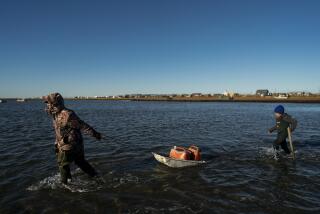Isolated Washington Enclave Near Breaking Point
- Share via
POINT ROBERTS, Wash. — Deb Wilkowski says she’s found paradise--and it can be a royal pain.
Point Roberts is a five-square-mile American enclave that dangles from British Columbia, surrounded on three sides by an inland arm of the Pacific Ocean. A round trip to the rest of Washington state and the Lower 48 involves four international border crossings--no small matter after the Sept. 11 terrorist attack led to tighter border security.
It’s a geopolitical quirk created by the 1846 treaty between the United States and Great Britain establishing the 49th parallel as the U.S.-Canadian border. Like a piece of dough left over after cookie-making, Point Roberts became a disconnected chunk of U.S. soil reachable only through Canada.
Only the Northwest Angle in Minnesota, a peninsula jutting into Lake of the Woods, is similarly isolated--the result of a surveyor’s error in the late 1700s.
“We feel like an island--without a ferry,” with both the splendid isolation and the problems that bespeaks, said Point Roberts’ Wilkowski.
Point Roberts, so named by British explorer George Vancouver in 1792, is a bucolic village of beach cabins and mini-mansions, a handful of shops, one tavern and one church, a schoolhouse, grocery, marina, fire station, golf course, and Lighthouse Marine Park, which doesn’t have a lighthouse.
There are no fast-food franchises, no stoplights, no doctor’s office or veterinary clinic, no theater, no motels, no drugstore, no City Hall--and virtually no crime. Point Roberts has all the security of a gated community, and people leave their houses and cars unlocked.
Just a half-hour drive from cosmopolitan Vancouver, Point Roberts is sleepy and serene. Locals revel in bingo at the fire station, strawberry socials at Trinity Church, boating, fishing, coffee klatches and golf.
“It’s like a piece of heaven,” one woman told Gov. Gary Locke during a recent visit.
About 1,500 people--roughly half American and half Canadian--live on Point Roberts year-round. The Point, as it’s called, swells by about 5,000 during the summer, adding to its seasonal getaway feel.
The eclectic population includes artists, filmmakers and airline pilots who commute to Vancouver, retirees from both countries, and a handful of people who scratch out a living working on The Point or commuting to Blaine or Bellingham in mainland Washington.
“There is no middle class here,” said Wilkowski, 36, who runs the garbage utility with her husband. “It’s like growing up in the Deep South, with haves and have nots.”
It can also be tough to live here, say townspeople who have to cross the U.S.-Canadian border twice just to get to the nearest American town for medical care, schools and other services. The nearest U.S. hospital is 70 minutes away in Bellingham.
Travelers go through a checkpoint at Point Roberts--not much delay here--and travel about half an hour through the bustling Vancouver suburbs and the countryside to get to a border crossing at Blaine and back into the United States. That can take an hour or more if trunks are being searched.
Eight million people cross the border at Blaine each year.
After the Sept. 11 attacks, both countries cracked down on border security. President Bush recently signed legislation authorizing 1,600 new immigration officers along the 5,500-mile border by 2006. That includes 100 new agents for Washington this year.
“We’ve been living and dying by that border for years,” said Ron Nielson, a 40-year Point Roberts resident, who owns the building supply store.
Several hundred townspeople showed up for the governor’s town hall meeting recently, both to sing Point Roberts’ praises and to complain about how cut off they feel from the rest of the county, state and nation.
Residents asked for help establishing a health clinic, a sewer system so they can build resort facilities, and a more extensive public education system.
“We thought you were going to sell off The Point to balance the budget,” ribbed Scott Miller, 41, when Locke toured his children’s school.
The unincorporated town’s homey two-room school has 35 pupils in kindergarten through third grade. After that, parents have to stick their kids on a bus and send them to Blaine.
Locke heard about how hard it is on the children to spend several hours a day on a bus, sometimes departing in the dark of early morning. Sports, music, drama, dances and other extracurricular activities are a logistical nightmare, parents said.
Wilkowski said the town will continue to have trouble attracting and keeping young families. As soon as a youngster makes it to the fourth grade, the family has to decide whether to move away, resort to busing, commit untold hours to home schooling, or pay for a private school in Canada, she told Locke.
Wilkowski said later that her family will send Izaac, 9, to private school in British Columbia. “He’ll learn French, but not U.S. history.”
Locke offered to help with economic development, implementation of a commuter lane at the Blaine crossing, and support for extra funding for their school.
Still, he gently pointed out, there are trade-offs to living in a remote area.
Wilkowski said her family has already made their peace with that. “We’ll live here forever,” she said. “We’re going to make it work.”
More to Read
Sign up for Essential California
The most important California stories and recommendations in your inbox every morning.
You may occasionally receive promotional content from the Los Angeles Times.













